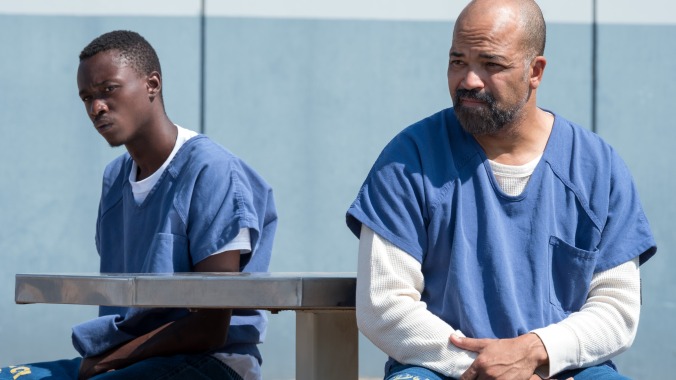Moonlight’s Ashton Sanders broods through the familiar Netflix drama All Day And A Night

It’s true that there’s nothing new under the sun, and that everybody’s paying tribute to somebody. But Netflix’s latest original movie, All Day And A Night, is uniquely disadvantaged in this department, as it’s the latest in a series of films about the young, Black male experience in Oakland, California to come out this decade. (Specifically, Blindspotting and Ryan Coogler’s Fruitvale Station both deal with themes similar to the ones explored in this film; Sorry To Bother You is in an orbit of its own.) Of course, a setting and a point of view can contain multitudes; how many movies have been made over the years about a well-to-do white guy in New York? But similarities also inevitably invite comparisons, and in All Day And A Night’s case, they’re not always flattering.
Ashton Sanders, who played the middle incarnation of Chiron in Moonlight, stars as Jahkor Abraham Lincoln, a.k.a. Jah, a quiet and observant young man who never stood a chance. Raised first by his physically abusive, emotionally distant dad, J.D. (Jeffrey Wright), and then by a series of makeshift father figures, Jah learns early on that the only way to survive in East Oakland is to internalize J.D.’s lessons on toxic masculinity. Under the influence of his equally troubled childhood friend, TQ (Isaiah John), Jah graduates from petty stickups to an unofficial bodyguard position with local drug kingpin Big Stunna (Yahya Abdul-Mateen II). What Jah really wants to do is make music, and he does lay down a track or two in his spare time. But once his girlfriend, Shantaye (Shakira Ja’nai Paye), becomes pregnant, his already narrow options shrink even further, leading to the desperate, misjudged double murder that opens the film.
Jah’s story is told with a wraparound structure similar to that of Coogler’s film, only from the perspective of a perpetrator of violent crime rather than a victim. Throughout the film, writer-director Joe Robert Cole grasps at themes in an attempt to diagnose Jah’s—and his neighborhood’s—issues, but never hangs on to any of them long enough to make much of an impression. The same can be said for the film’s nonlinear structure, which is scattered enough that it can only create impact through scene-to-scene juxtaposition, never cumulatively. Toward the end of the film, All Day And A Night does find a thesis when Jah and J.D. are reunited in prison, but by then it’s too little, too late.
One thing that could have tied the film’s many threads together is Sanders’ performance. But although he remains, as in Moonlight, an iceberg of an actor—hiding intriguing depths underneath a chilly surface—here the filmmaking lacks the emotional intelligence to effectively showcase that interiority. Similarly, Wright plays against type as a pitiless, self-centered bully, but the pain behind his character’s chaotic life choices is more stated than felt. What lyricism the film does possess comes largely from its lush, satiny cinematography. But again, the influence of Barry Jenkins’ film, particularly on the use of color, is obvious enough to count against All Day And A Night.
Systemic racism, lack of economic opportunity, and the school-to-prison pipeline are, of course, serious issues that need to be addressed. But in an era where Black filmmakers are producing fresh, innovative work that redefines the rules and expands the scope of Black storytelling on screen, a gritty drama about life on the streets that’s full of gangster posturing and flashing Glocks just doesn’t spark in the same way, particularly when it’s as unfocused as All Day And A Night. And it’s odd, because Cole had a key part in one of the biggest game-changers in Black cinema this decade: a co-writing credit on Black Panther. But where that film was expansive and forward-thinking, this one feels like a throwback—and not in a good way.